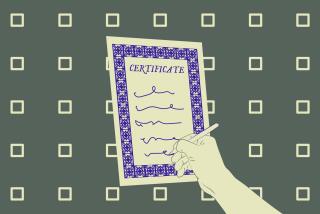Seeking a Cure for Lost Medical Records
- Share via
Question: My mother’s doctor died suddenly not long ago, and we are wondering how to obtain her medical records from his office. After we were notified of his death, we were unable to reach his secretary at the office, and now we can’t find her at all. We heard she went to work for another doctor but we don’t know his name. Those records have traveled from Ohio to Florida to California, and we feel they are important to have for mother’s new doctor. Would the Los Angeles chapter of the American Medical Assn. be able to help us or can you think of another organization to contact?--L.S.
Answer: Like the handwriting on their prescriptions, the way doctors keep and pass on their medical records is also distinctive.
“Unfortunately,” a spokesman for the California Medical Assn. says, “there’s no specific procedure for passing on medical records . . . no ‘elephants’ graveyard,’ that is, where they all end up. It’s a very individual thing.”
Normally, when a doctor is getting ready to retire, or is moving his office, there’s not a critical time factor involved, and most of them (“most,” you will notice) will drop their patients a card asking for written instructions as to where individual records should be forwarded. The only standard rule in all this is that any request for the disposition of individual medical records has to be in writing.
But doctors are human, which means that some of them are also absent-minded or careless and may move on (“or just simply disappear,” the medical association spokesman adds) without taking care of the records on hand.
We certainly can’t fault your doctor on this score, however. Medical records and their disposition were the least of his worries.
Certified Letter
What the association suggests you do is mail a certified letter to the last address of the doctor. Address it: “To the Estate of . . . “ and specify where you would like your mother’s records forwarded (fully identifying her in the process, of course). This puts the ball in the court of the doctor’s executor, who has the legal responsibility for winding up the loose ends of the doctor’s obligations.
If by any chance that doesn’t work, then the next best bet is to go to the doctor’s office and talk to the building manager, who should have some record on hand as to where the doctor’s furniture, equipment--and records--were moved.
The last resort, the medical association spokesman adds, would be to try to find the doctor’s widow and ask for guidance. But it would be far better, if at all possible, to spare her this last, painful chore.
Q: I read your column on accelerated mortgage payments with a great deal of interest.
The area that I can’t seem to get a straight answer on from brokers or bankers deals with the acceleration of an existing 30-year loan as opposed to refinancing with a 15-year loan.
Non-professionals with whom I’ve discussed it portray the refinanced 15-year loan as being lower than simple accelerated payments. I am now facing this problem and would appreciate your comments on the subject.--G.B.
A: I’m not sure, exactly, what these non-professionals mean when they say the 15-year loan is “lower” than simple accelerated payments. Lower in terms of monthly payments? Lower in initial costs? Lower in realized savings?
There’s no hard-and-fast answer to your question without knowing more details about your loan--what interest rate are we talking about? How much of a loan is it? What are your monthly payments? If you have a relatively low interest rate to begin with, it’s normally no contest--it’s cheaper to simply accelerate your payments because of the “origination” fee and the other costs involved in going through the refinancing process.
For instance, if you’ve got a 30-year, 13% mortgage and a $100,000 loan, your payments are now about $1,107 a month. By refinancing it (at 13%) for 15 years you would increase your payments by $159 a month, to $1,266. So, why pay out as much as $3,000 additionally in origination and miscellaneous costs if you can achieve the same thing by simply accelerating your payments $159?
Different Game
Ah-hah! But interest rates have dropped, and if you can now refinance for 15 years at 10% instead of 13%, then it’s an entirely different ballgame. Now, your payments are going to drop to about $1,075 a month--$32 a month less than you are now paying for a 30- year loan, so the extra charges are well worth it. Occasionally, too, you will find a lender who will shave the interest rate an additional half point for a 15-year loan, which is an added bonus. However, I’ll have to warn you that the 15-year loan has become so popular that such an incentive is proving unnecessary with many lenders and, therefore, a bit rare these days.


